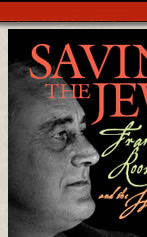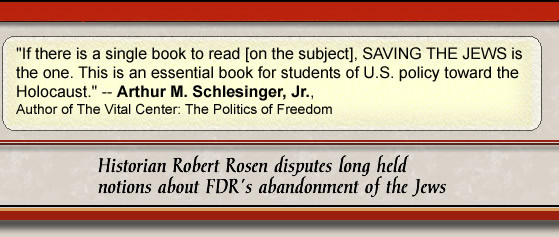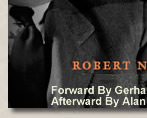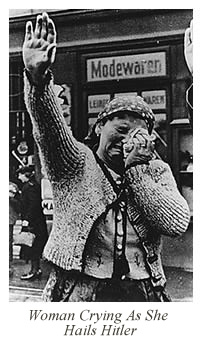




|
Reviews |
|
|
|
|
|
|
Why I Wrote The Book |
|
|
Excerpts |
|
|
Table Of Contents |
|
|
Auschwitz |
|
|
SS St. Louis |
|
|
Timeline |
|
|
A Survivor Speaks Out |
|
|
Carter Center Speech |
|
|
Justice At Nuremberg |
|
|
Purchase |
|
|
Related Links |
Justice At Nuremberg Began With Early Efforts By Roosevelt BY ROBERT N. ROSEN But for Americans, especially the Greatest Generation still among us, it is also a time to reflect on the character and leadership of the American president who, as much as anyone, brought Hitler and his evil henchmen to justice and envisioned the Nuremberg Trial, Franklin Delano Roosevelt. Robert H. Jackson, a Roosevelt appointee to the Supreme Court and the eloquent chief American prosecutor at the Nuremberg Trial, not only credited FDR with the creation of the war crimes tribunal but also with the deliberate decision that "there be documentation of the crimes" so that the facts would never be forgotten.Roosevelt detested Hitler and the Nazi regime from his earliest days in the White House. "The situation is alarming," Roosevelt told the French ambassador in 1933. Hitler's "counselors are even madder than he is." Roosevelt, alone among world leaders, ordered the return of the American ambassador to Germany after the Nazi anti-Jewish pogrom of November, 1938, known as "Crystal Night." In early 1939, he told the Senate leadership that Hitler was a "wild man ? we would call him a 'nut,' " Even before Pearl Harbor, he pledged the American people "to pull our own oar in the destruction of Hitlerism." Hitler detested Roosevelt with a passion. The fuehrer mocked and ridiculed the president in the longest speech he ever made to the Reichstag.  When news of the massacre of Jews filtered out in 1942, Roosevelt immediately
threatened swift punishment against Nazi war criminals. In July 1942,
he sent a message to a mass protest meeting at Madison Square Garden,
stating that the American people "will hold the perpetrators of
these crimes to strict accountability in a day of reckoning, which
will surely come." He warned Germans on August 21, 1942, that
war criminals would face "fearful retribution." He proposed
a United Nations Commission on Atrocities to deter those committing
the murders and to let them know that "the civilized world ? will
mete out swift and just punishment on the reckoning day." When news of the massacre of Jews filtered out in 1942, Roosevelt immediately
threatened swift punishment against Nazi war criminals. In July 1942,
he sent a message to a mass protest meeting at Madison Square Garden,
stating that the American people "will hold the perpetrators of
these crimes to strict accountability in a day of reckoning, which
will surely come." He warned Germans on August 21, 1942, that
war criminals would face "fearful retribution." He proposed
a United Nations Commission on Atrocities to deter those committing
the murders and to let them know that "the civilized world ? will
mete out swift and just punishment on the reckoning day."
Early in the war, Roosevelt and Churchill favored the summary execution of the Nazi ring-leaders. On Oct. 7, 1942 Roosevelt warned the Nazis that they would be subject to "just and sure punishment," that "when victory is won the perpetrators of these crimes shall answer for them before courts of law," and that the "successful close of the war shall include provision for the surrender ? of war criminals." On Dec. 17, 1942, Roosevelt and other Allied leaders issued the United Nations Declaration on Jewish Massacres which denounced "in the strongest possible terms this bestial policy of cold-blooded extermination." The declaration condemned the German government's "intention to exterminate the Jewish people in Europe" and reaffirmed "their solemn resolution to ensure that those responsible for these crimes shall not escape retribution." "11 Allies Condemn Nazi War on Jews," read the front-page headline in The New York Times the next day. Throughout the war, President Roosevelt continually demanded justice for the victims of the Holocaust. Roosevelt, Churchill and Stalin issued the Moscow Declaration Regarding Atrocities on Nov. 1, 1943 which made it crystal clear that when the war ended, "those Germans who have been responsible for atrocities, massacres, and executions will be sent back to the countries in which their abominable deeds were done ? and judged on the spot." The Allied Powers, the Declaration promised, "will pursue them ? and will deliver them to their accusers in order that justice may be done." Sternly warning the Nazis to stop the massacre of Hungarian Jewry in 1944, Roosevelt promised that the guilty would be pursued and would be delivered up "to those nations where the war crimes had been perpetrated ? None who participate in these acts of savagery shall go unpunished ? All who knowingly take part in the deportation of Jews to their death ? are equally guilty ? all who share the guilt shall share the punishment." Roosevelt believed the German people as a whole had "been engaged in a lawless conspiracy against the decencies of civilization" and that war crimes trials would drive that point home to the world at large and the German people in particular and establish the Holocaust, as it indeed has, as a historical fact of signal importance. The punishment of the guilty, Roosevelt told his close advisor, Judge Samuel I. Rosenman, "shall be swift." But the hardened SS murderers led by their fanatical fuehrer did not heed Roosevelt's warnings. Among Roosevelt's last acts in April 1945 was to send Rosenman to Europe to prepare the way for the Nuremberg Trial. When the war ended Franklin Roosevelt was dead. But his commitment to bring the Nazis to justice lived on. President Harry Truman carried out his policy. The famous Nuremberg Trial of the top Nazis opened on November 20, 1945. It was followed by 12 subsequent American military tribunals for high-ranking Nazi officials, the SS leadership, the mobile killing squads (Einsatzgruppen), doctors responsible for medical experiments, industrialists, including I.G. Farben officials and many others. A total of 3,887 cases were opened in the American sector Dachau war crimes program alone. In a host of lesser trials, including camp guards, 1,416 were convicted, and 324 death sentences were handed down. The Western Allies handed down 800 death sentences of which 500 were carried out. Between 1947 and 1953, the Western Allies tried 10,400 accused Nazi war criminals, 5,025 of whom were convicted. Roosevelt's wise and conciliatory leadership of the Allied coalition, his amazing foresight, his total commitment to the destruction of Nazism, and his commitment to the just and fair trial and punishment of the guilty as well as the documentation of the Holocaust for all time stands as a legacy of American justice to be remembered with pride by all Americans on Holocaust Remembrance Day. |